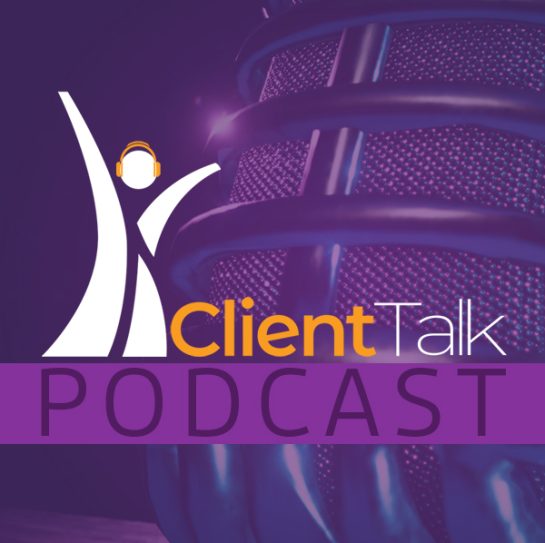ClientTalk is where our industry experts give you their best insights and best practices across the spectrum of social services. With storied careers and thoughtful points of view, the leaders here at Eccovia know about a lot more than compliance—because they’ve been where you are.
We’re proud to introduce our inaugural episode of ClientTalk, our podcast dedicated to providing insights and best practices across the spectrum of social services. In this episode, we talk with Ken Davidson, head of Client Success at Eccovia, about comparable databases and what victim service providers (VSPs) should know when looking for a comparable database for their organizations.
Below is a summary with the main ideas from our podcast episode, “Driving Better Outcomes for Victim Service Providers.”
You can listen to ClientTalk episode 1 here.
Q: What is a comparable database, and why is it important?
- A comparable database is a database for VSPs (i.e., domestic-violence shelters, rapid rehousing, or supportive housing) to collect client-level data.
- A comparable database is defined by HUD as a relational database that meets all homeless management information system (HMIS) data standards and the minimum standards of HMIS privacy and security. It also needs to produce CVS files for reporting to HUD.
- A “relational database” is a series of data tables with predefined relationships between them. Excel and Google Sheets do not meet this definition.
- If you are a victim service provider who receives funding from the US Department of Housing and Urban Development (HUD), you have to use a comparable database to upload APRs to the Sage HMIS Reporting Repository. Not having one can impact your ability to secure future funding from HUD.
- A comparable database should do the following:
- Provide stricter security and data privacy than the continuum of care’s (CoC’s) HMIS,
- Control who can access the system and see client information, and
- Allow flexibility with modifications to questions being asked.
- Questions to ask yourself when shopping for a comparable database:
- Can it collect client-level data over time?
- Can it produce aggregate reports without any manual manipulation?
Q: Why do VSPs need a comparable database, and not just an HMIS?
- The Violence Against Women Act (VAWA) and the Family Violence Prevention and Services Act (FVPSA) prevent VSPs from sharing personally identifiable information (PII) of victims, including entering information into an HMIS. This is for the safety of victims of domestic violence. The data must be aggregate only.
- PII is any information that can use to directly identify an individual (i.e., names, Social Security numbers).
Q: How do VSPs know whether they meet the legal definition of a victim service provider?
- The HEARTH Act defines a victim service provider as a private nonprofit organization whose primary mission is to provide services to victims of domestic violence, dating violence, sexual assault, or stalking. These might include rape crisis centers, domestic-violence shelters, and the like.
- Some VSPs might want to avoid participating in a local HMIS in some circumstances:
- If your agency is not primarily a VSP but receives funding from the Office of Violence against Women (OVW), Office of Victims of Crime (OVC), or the FVPSA, you’re prohibited from using an HMIS and should be using a comparable database.
- If your agency receives funding from one of the above for a specific project in your organization and those funds are not used for overall agency administration, then you cannot use HMIS for that specific project in question, but you can use HMIS for other unrelated projects.
Q: So I’ve determined I need a comparable database; what now?
- Key considerations:
- Does the software meet HUD’s comparable database requirements? (Find the related paper.)
- Does the software have automatic time-outs, concurrent login prevention, username and password access requirements, and 120-bit encryption, to name a few best practices?
- Does the software support routine password changing at regular intervals?
- Study deeply the security requirements by HUD, and make sure all users have complex passwords
Q: What else should I consider when deciding on a comparable database?
- The software should be able to produce annual performance reports (APRs) or other agency-required reports?
- Is the system customizable? If the software isn’t, you might have to use multiple systems, and no one wants to have to do dual data entry.
- Check the out-of-the-box capabilities:
- Safety plans
- Logging and tracking of protective orders by the courts
- Hotline calls
- Case note templates
- Goal planning
- Offender data
- Look at overall costs, not just licensing costs. Many vendors base it on user licenses (i.e., number of users).
- Look at the amount of time that your staff spends on reporting; that’s an extra cost when you don’t use the right software.
- Ask the vendor about additional costs:
- What’s the total cost of ownership going to be?
- Does it include data migration or tech support?
- Does it include training or documentation?
- Does it include hosting fees, annual maintenance fees, or set-up fees?
If you’d like even more nuggets of wisdom, listen to the episode. If you’re interested in ClientTrack as a potential comparable database, schedule a demo with our industry experts!
Enjoy This Article? You Might Also Like:
Why Domestic Violence Awareness Matters



